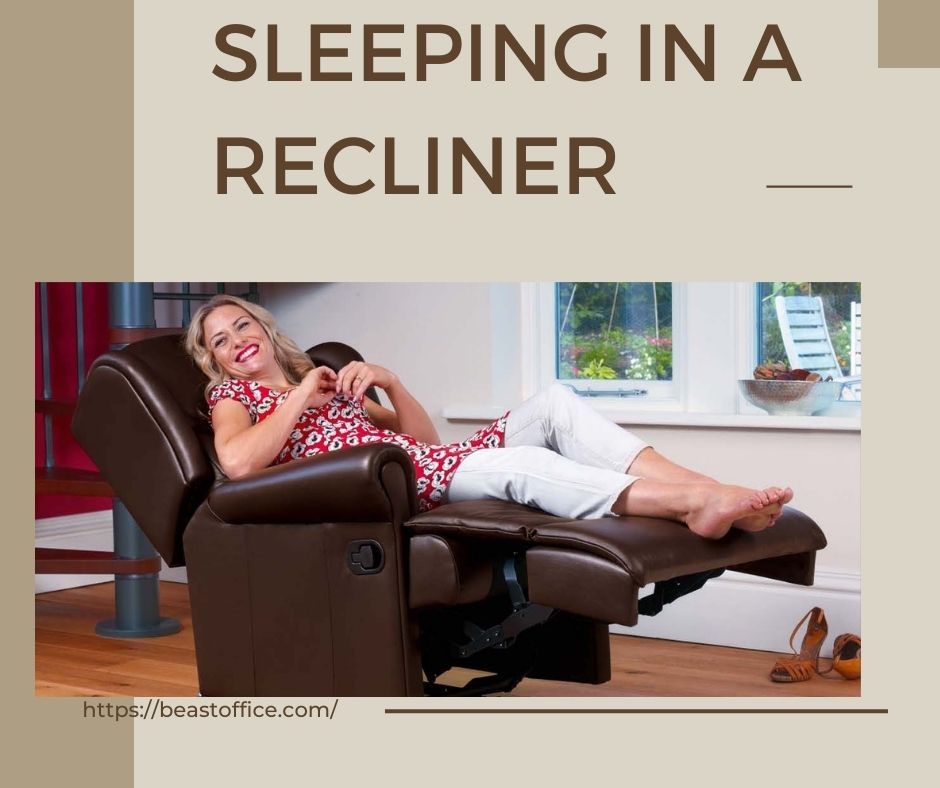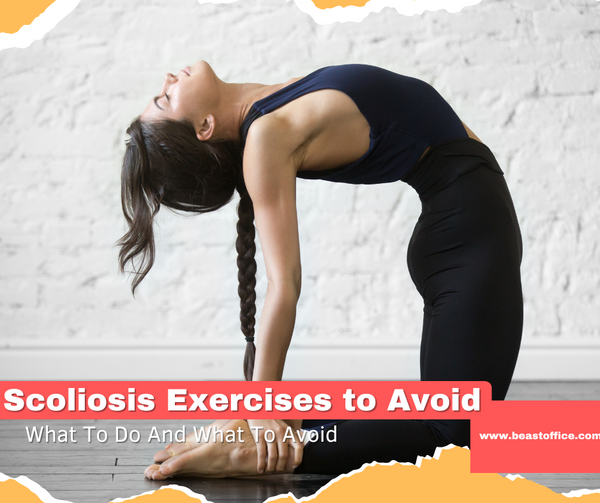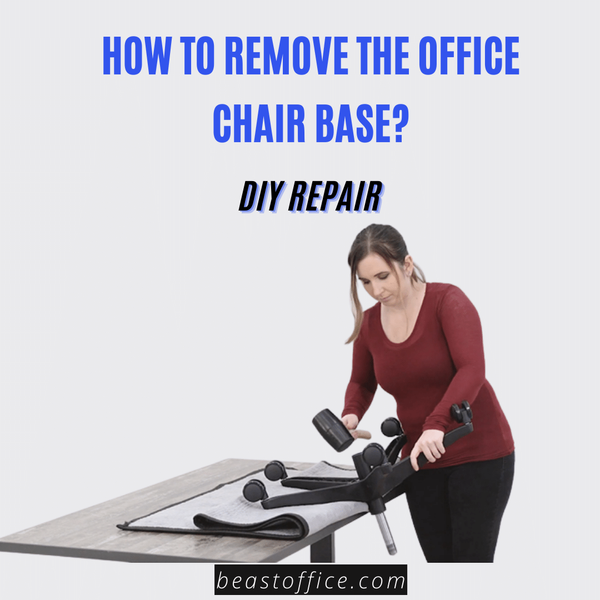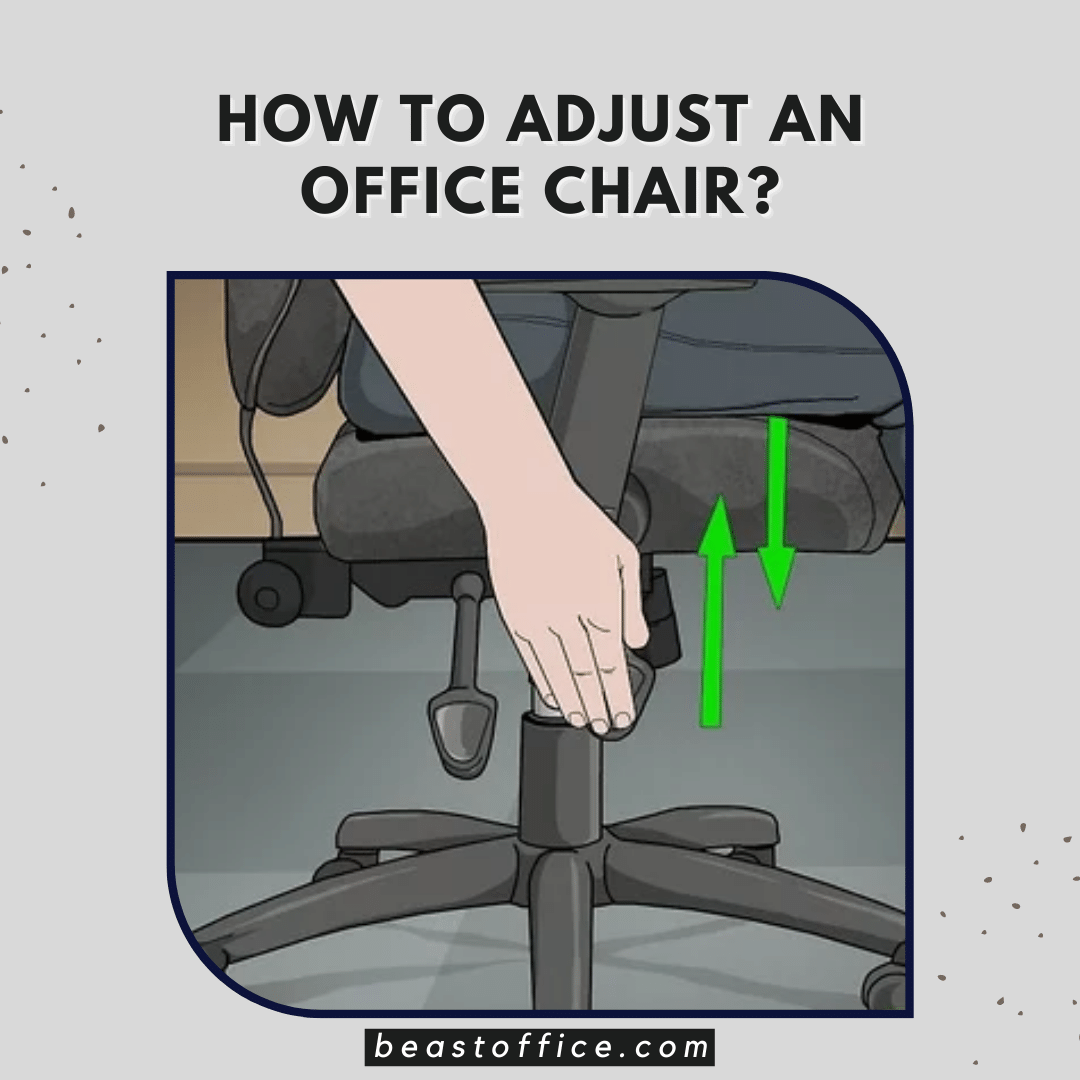Here's why: recliners are designed with a low center of gravity, which makes them easier to move around than beds. Plus, they have built-in headrests and lumbar support, which helps to relieve tension on your spinal cord. If you're struggling to find a comfortable sleeping position, trying sleeping in a recliner may help you get some rest.
Sleeping in a Recliner - Don't Hustle
Sleeping in a recliner is not for everyone. Depending on your comfort level and the size of your chair, sleeping on it can be comfortable and restful. However, some people find their backs hurt from sleeping in their recliner.
It provides comfort and support for the back, neck, and legs. They often have built-in heaters, massage features, and footrests. While these features may be tempting to use when you're awake, they should be avoided while sleeping in your recliner.
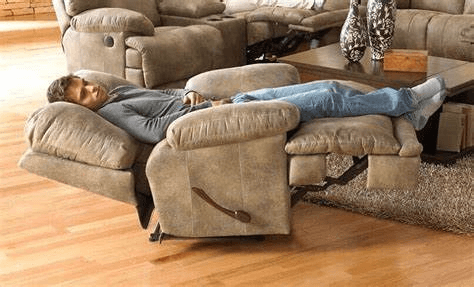
Sleeping Techniques in a Recliner
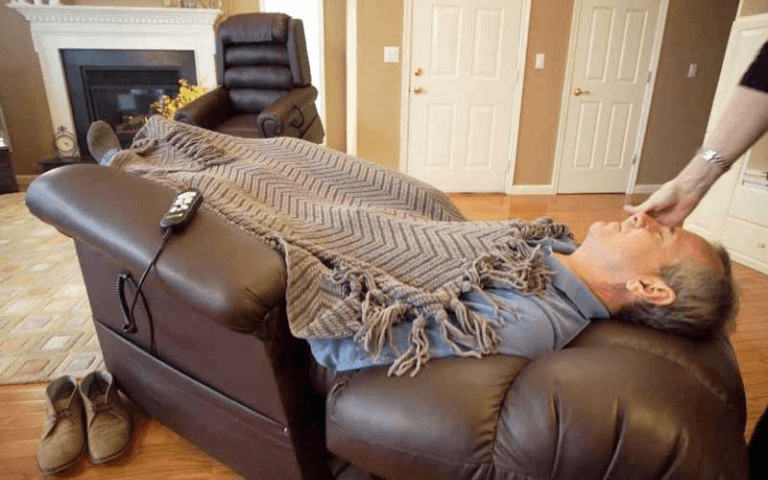
Some techniques for sleeping in a recliner include:
- Lower the back of the chair as much as possible before you lie down. This helps with circulation and prevents lower back pain while sleeping.
- Try using pillows to support your head, neck, and arms when resting comfortably in your recliner. Pillows help relieve pressure on these areas so that they don't become sore when lying down for extended periods.
- Adjust the footrest so that it supports your feet comfortably while lying down. This helps to keep your spine straight while sleeping instead of allowing it to bend forward or backward into an unnatural position that causes hip pain and other issues later on in life.
- Enough place for the head: Make sure that there is enough room for the head of your bed to be elevated more than normal so that your head does not rest on the back of the chair (this can cause neck strain).
- Bedding around the chair’s curves: Make sure that your bedding fits around the chair's curves so that you do not get any wrinkles or folds where they should not be.
- Place pillows under your knees if they start hurting while sleeping in a recliner chair (this will help prevent blood flow from stagnating).
What Comfort Recliner Provides?
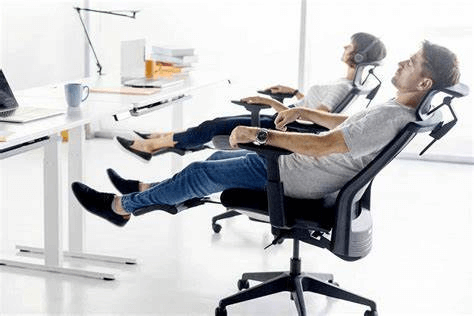
A Comfort Recliner can provide all the comfort you expect from a recliner but with some added benefits for your body and mind.
Comfort Recliners offer:
- Full-Body Support: A recliner should offer full-body support. This means that when you sit down on your Comfort Recliners, the foam padding will contour your body and support your head, neck, back, and legs. This allows you to relax in an upright position while benefiting from lumbar support and spinal alignment.
- Adjustable Lumbar Support: This feature allows you to adjust the amount of lumbar support offered by the chair as needed to ensure that your spine stays aligned while sitting for long periods.
- Armrests & Chair Arms: A comfort recliner provides your body with a place to rest your arms and elbows while relaxing in a comfortable position. The armrests should be wide enough to fit comfortably on either side of your body when seated in the chair.
- Reclining Mechanism: A recliner must have a smooth, quiet mechanism that allows users to lower themselves into various positions without straining their arms or shoulders. Reclining mechanisms also provide support for backrests as they're lowered into position.
- Back Support - The best recliner chairs provide adequate back support for long periods of sitting or relaxing; this ensures that you won't experience soreness or discomfort from prolonged use of the chair.
Recliner vs Bed - Which Is The Best?
Pros and Cons
Pros:
- Sleep comfort: You can sleep in any room in your home without worrying about taking up too much space or being on the ground floor if you're worried about falling at night.
- Back Support: Your back will be fully supported by the chair's backrest, which means that you won't have any spinal problems when you wake up in the morning.
- Prevent Bed Sore: Sleeping in a recliner can help prevent bed sores from developing due to constant pressure from lying on one side all night (especially if you sleep with just one pillow).
- Convenience: Recliners are great because they're easy to get up from. If you have trouble getting out of bed, they can make it easier for you to rise and move around your home.
- Relaxation: If you're having trouble sleeping on a traditional mattress, a recliner might offer the support you need while relaxing enough to help you nod off.
- Portability: Recliners aren't heavy or bulky like a traditional mattress and box spring set, so if your home has limited space or mobility issues, this could be a better option than trying to fit two twin beds into one room, for example.
Cons:
Using a recliner can cause serious health problems:
- Pressure sores: Spending too much time sitting in a recliner chair will cause pressure sores on your skin. There will be no blood circulation in your legs which causes swelling and soreness.
- Blood clots: Sitting for too long in an upright position will increase the risk of developing blood clots in your legs or feet because they have been deprived of oxygen in a good position for too long.
- Lower back pain: People who sleep in a recliner show less spinal flexibility than those who sleep on their side or stomach.
- Arthritis: If you have arthritis or osteoporosis, sleeping on your side or stomach may be more comfortable than sleeping in a recliner. Sleeping on your back can put pressure on your joints and make them stiffer than normal.
- Obesity: People who are obese are at risk of developing sleep apnea, which is caused by breathing problems during sleep.
- Lungs Problem: When you lie in a recliner, your lungs compress and stop expanding completely. This can cause serious health problems such as sleep apnea.
Sleeping In A Recliner After Hip Replacement
Sleeping in a recliner after hip replacement surgery can be challenging. The position of the recliner may not be as comfortable as the bed, and it may be challenging to get up and move around.
Reclining is necessary for pain management after surgery, but it may not be the best position for sleeping. Sleeping in a recliner after hip replacement surgery can cause some problems, especially if you have limited mobility or sleep apnea.
People who have undergone total hip replacements often sleep in a recliner for several weeks after surgery because they are advised not to lie flat on their backs. This is because lying flat puts pressure on blood vessels that supply blood to the heart, which can increase blood pressure and cause complications with other organs, such as your kidneys and lungs.
However, sleeping in a recliner after hip replacement surgery may not be ideal because it can lead to increased pain levels during the night and make it more difficult for you to breathe while sleeping. Suppose you already have trouble breathing when lying down flat on your back due to obstructive sleep apnea (OSA) or other respiratory issues. In that case, sleeping in a recliner will only worsen things.
If you decide to sleep in a recliner after your surgery, you must take precautions against blood clots and prevent bedsores. It would help if you also used pillows to prop yourself up at an angle so that your hips are higher than your head when sleeping.
Can pregnant women sleep on a recliner?
The answer is yes, but with a few precautions.
Pregnant women can sleep in a recliner as long as they are comfortable and have no problems with their back or pelvis.
The biggest concern is that the recliner doesn't put any pressure on the front or back of your abdomen. If you're lying down, you should always have pillows under your knees and between your legs to keep the pressure off your abdomen and lower back. The same goes for sitting up if you're using an adjustable bed.
If you're sleeping upright in a recliner, ensure both feet are flat on the floor so that blood flow isn't cut off from either foot and leg, which can cause numbness or tingling sensations in those extremities.
Side Effects And Precautions For Sleeping In A Recliner
Sleeping in a recliner is something other than what you should do regularly. The reclining position can cause the neck to be awkward, which may lead to discomfort and injury. It can also lead to muscle cramps and back pain.
Patients with heart conditions should avoid sleeping in a recliner because it can cause breathing difficulties. This is especially true if the patient has COPD or asthma and sleep apnea, a condition where breathing stops for short periods during sleep.
If you cannot sleep comfortably on your back or side, try sleeping in your recliner for a few nights before making it an everyday habit.
Severe back pain can also occur if you sleep in your chair for more than two weeks without moving. This is called "recliner back syndrome." It can happen if any part of your body is compressed for too long or if you are overweight.
The longer you sit still, the less blood flows through your veins. This results in swelling and inflammation that may cause damage to your tendons, muscles, and ligaments.
You may also experience numbness in your legs or feet due to poor circulation.
In extreme cases, recliner back syndrome could result in permanent nerve damage.
The primary benefit of sleeping in a recliner is that it allows the spine to maintain its natural curve while resting. This helps to prevent pinched nerves and discs that can occur from sleeping on your back or stomach.
Sleeping in an upright position can cause lower back pain and neck pain if not done properly
Sleeping in an upright position may lead to heartburn or acid reflux due to the swallowing of excess stomach acid during sleep
Sleeping in a recliner also opens up your diaphragm, which helps you breathe easier. It also gives you more room for your head and neck to breathe freely.
Not only does sleeping in a recliner open up your diaphragm and make breathing more accessible, but it’s also easier on your back. The chair supports your back so it doesn’t feel like it will collapse while you sleep!
When It Might Be Better for Your Health to Sleep in a Recliner?
It helps with symptoms of acid reflux
When you're sick, there are certain things you should do to take care of yourself. Sleeping in a recliner is one of them.
Sleeping in a recliner can help with symptoms such as heartburn and indigestion if you have acid reflux.
The main reason is that it keeps your head lower than your stomach. This is because gravity pulls on the food and liquid in your stomach when you lie flat on your back. This causes it to push up against the lower esophageal sphincter (LES), which separates the esophagus from the stomach. The LES acts as a valve between these two organs, closing if anything tries to pass from one into the other — like food or liquid.
When this valve opens up, it lets food and liquid into the esophagus where they don't belong. This causes heartburn since there's no place for this stuff to go but back out onto its way down into your stomach again!
The best way to sleep in a reclining chair is to find the most comfortable position. Some people prefer to lie flat, while others prefer to keep their heads slightly elevated. There are many reasons why sleeping in a reclining chair may be beneficial, including:
- It's easier on your spine. Sleeping in a reclining chair keeps your head elevated above your heart, which can help reduce snoring and prevent acid reflux from occurring during the night.
- You won't get stiff. Sleeping in a reclining chair helps keep this valve closed by elevating your head so that gravity can't open it up.
- Your breathing will be better regulated. Your diaphragm can only expand fully when lying down flat on your back (not on your side), so sleeping in a recliner helps keep this important muscle relaxed and healthy.
It Reduces Symptoms Of Sleep Apnea
When you sleep in a recliner, you may be able to reduce symptoms of sleep apnea. This is because reclining positions can help keep the tongue and throat muscles relaxed.
Sleep apnea is a common condition that causes people to stop breathing while they sleep. It usually occurs when the upper airway becomes blocked or narrowed — either partially or fully. The airway then opens up again and closes again (like a window blind), which causes loud snoring and breathing interruptions during sleep.
Sleep apnea affects about 9 percent of U.S. adults and is more common among people with obesity, diabetes, heart disease, and high blood pressure. And it's more likely to occur if you're male, older than age 65, or have a family history of the condition.
Sleeping In A Recliner After Back Surgery
Sleeping in a recliner after back surgery is one of the best ways to avoid complications. The chair allows you to elevate your legs and rest in an upright position while giving your lower back and spine some relief from pressure.
Recovery from back surgery is difficult and painful, but sleeping in a recliner after back surgery can make it easier for you to stay comfortable throughout the night. The recliner allows you to elevate your feet above your heart, which will help reduce swelling, pain, and fatigue.
In addition to decreasing swelling and pain, sleeping in a recliner can help prevent blood clots from forming in your legs. When you sleep with your legs elevated above your heart level, it helps increase blood flow through the veins in your legs and prevents them from clotting up while you sleep. This can help reduce swelling as well as the risk of developing deep vein thrombosis (DVT) during recovery from back surgery.
Is it better to sleep flat or reclined?
A new study has revealed that sleeping in a recliner could help reduce sleep apnea symptoms.
The researchers noted that tilting people 7.5 degrees in bed reduced OSA severity by 31.8% on average. The scientists also found that there was a significant difference between the amount of time it took for the body to fall asleep when reclining versus lying flat on their back.
According to the study, "Asleep in 60 seconds: the effect of head-of-bed elevation on sleep quality, snoring, and blood pressure in patients with obstructive sleep apnoea syndrome," participants who slept in recliners were able to fall asleep within an average of 66 seconds while those who slept flat took an average of 136 seconds to do so.
"This is not surprising because people tend to wake up if they suffer from sleep apnea," study co-author Dr. Thais Russomano told Medical News Today. "We think this happens because the brain receives less oxygen without sufficient ventilation."
Final Words
Recliners have a unique design and are known for their comfort. They also let you sleep in the optimal position that suits your body type. This article is a handy guide for all queries regarding the recliner chair. It may affect you medically if you lean on it all day long. After consulting every fact, recliners can be the best option when used properly.
Related Posts


